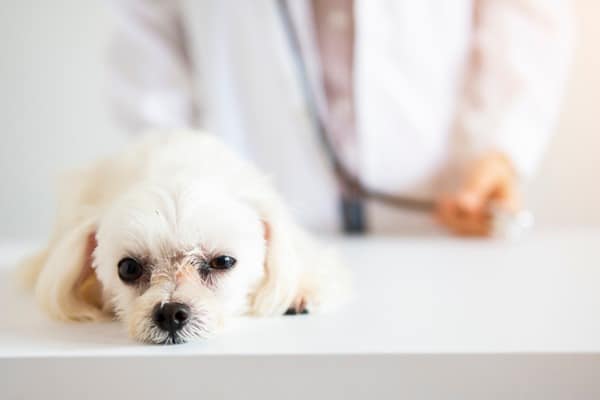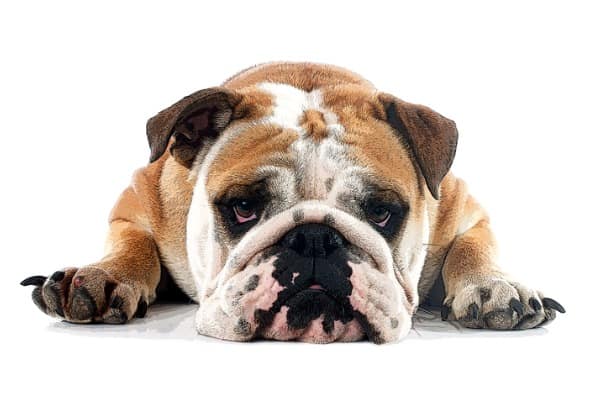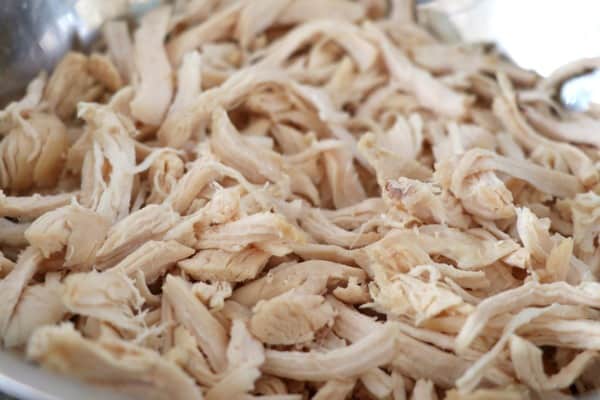Every pet parent will deal with the problem at one point or another – doggie diarrhea.

You already know that sometimes, despite all the precautions you might take, there are things beyond your control that can lead to your dog or puppy getting a bout of diarrhea.
We feel you:
Sometimes it has to do with food and allergies, sometimes, it has to do with an illness, and sometimes the cause can seem like a real mystery.
In any case, it’s a problem you must deal with quickly, or things will get messy – and stressful – for everyone in the house.
Narrowing down the causes of your dog’s symptoms often involves looking for other symptoms.
These can be valuable clues that will help you, or in some cases, the vet, understand the underlying problem.
So, what about when your dog has runny poop but seems fine?
Then it’s time to take a closer look at anything different about your dog – or their routine.
Diarrhea in dogs isn’t normal, and even if they seem fine otherwise, loose stool is a sign that something is definitely up.
However, that doesn’t always mean a trip to the vet is necessary.
We’ll talk about possible causes and when to take it seriously.
When to Take Precautions with Dog Diarrhea
There are some cases where diarrhea in an otherwise asymptomatic dog warrants a closer look – and some extra measures to ensure your dog’s safety.
Bloody Diarrhea
Even if your dog has diarrhea but acts fine and is eating, they need to see a vet at the first sign of bloody diarrhea.
Bloody, loose stools can indicate several serious problems, such as internal bleeding, bowel obstructions, or parvovirus.
Read this:
The canine parvovirus can be fatal if not treated promptly – especially in puppies, who are more susceptible because they cannot be vaccinated against it until 6-8 weeks of age.

They are not fully protected until they receive the third vaccination around twelve weeks of age.
Don’t wait to seek help.
Severe diarrhea in puppies should be addressed and diagnosed swiftly, even if there is no blood present.
Loose stool or diarrhea can be one of the first symptoms of parvo. If your puppy has diarrhea but seems fine, the situation can deteriorate to life-threatening territory in a matter of hours.
Severe diarrhea caused by parvo can be accompanied by vomiting, which can lead to intense dehydration that sends your puppy into shock if they don’t receive medical care.
Don’t risk it:
Because of the dangerous nature of parvo, we recommend contacting your vet about diarrhea in puppies or adult dogs who have not been fully vaccinated.
It’s scary to think of your puppy contracting this illness, but you can take a few precautions to lower their risk.
Puppies and dogs who are not fully vaccinated should stay away from all communal dog areas.
This includes dog parks, pet stores, hiking trails, and any area unfamiliar dogs may frequent.
Some vets will even recommend you don’t let your unvaccinated puppy on the floor of the vet’s office.
Diarrhea caused by parvo is also a perfect means for it to spread, and it can live for months or more both inside and outside.
This is why you should never let your unvaccinated puppy anywhere unless you are 100% no other dogs or only vaccinated dogs were there before.
It’s not worth the risk.
It may seem extreme and like it’s taking some fun out of being a new puppy parent – but these safety precautions only need to be followed until the puppy reaches around twelve weeks old and has gotten the last vaccination.
The alternative is much more serious, and parvo is highly contagious.
In this case, it is definitely better to be safe than sorry.
If your puppy is suddenly suffering from diarrhea, call the vet.
Parasites that cause diarrhea
If your dog isn’t on a parasite preventive medication, their diarrhea could be a result of a parasitic infection.
There are a few sources of this parasite, not to mention one that people don’t realize, such as a dog who eats poop.
But it’s tricky…
Unless the infection is extreme, your dog might not display any unusual symptoms.
They can have worms and continue to eat, drink, and play as usual.
Diarrhea can be a preliminary symptom of parasites before other symptoms present – weight loss in dogs, and a distended abdomen often follow if the worms aren’t treated.
However, these symptoms are sometimes hard for pet parents to notice as they develop over time.
It’s easy to think your dog’s only symptom is diarrhea. You might notice they’re scooting more often as well.
Your dog might need to be tested and treated for worms, which can cause worse – and more stomach-turning – issues if ignored.
Toxins
Dogs can ingest any manner of unacceptable things and develop diarrhea before other symptoms.
Any time your dog eats something they’re not supposed to, it’s essential to monitor any changes in them.
Obviously, some cases require prompt vet treatment.
A dog who eats large amounts of cocoa, xylitol (which can happen if a dog eats a lot of sugar-free gum), certain plants, pesticides or poisons, or antifreeze should be taken to the vet immediately.
Dogs sometimes get a hold of foods that are contaminated with salmonella, which is another condition that can cause diarrhea and needs a vet’s treatment.

Don’t panic:
Some things can cause your dog to have diarrhea without necessarily being life-threatening.
If your dog ate something you’re unsure about, it’s a wise move to call the vet and verify what you should be watching for as far as symptoms go.
The less harmful things they might eat, like too much grease, dairy, or perhaps the cat’s food – will only cause diarrhea as your dog passes it through their system.
If this is the case, your dog should be closely watched for signs of dehydration. Your pup may also develop gas afterward. Check out what to give for doggie gas pain, if needed.
Any sudden changes in their condition need to be reported to the vet.
When the Answer is Less Scary for Dog Diarrhea
A dog with loose stool or diarrhea isn’t always in danger.
There are some causes that are, unfortunately, more than anything, but nothing to be worried about as long as diarrhea clears up in a day or two.
So if your dog has diarrhea and seems fine otherwise, take a closer look at anything that changed in their lives recently.
Canine Stress

The stress response can cause diarrhea in many animals, dogs included.
They could have diarrhea because they’re just plain stressed out.
What are some common reasons dogs become stressed?
Traveling is a primary culprit for causing anxiety in dogs.
Whether it’s by land, sea, or air, this disruption in their routine and familiar space is enough to send their stomachs into chaos.
Travel for dogs involves new smells, unfamiliar places, and people, and sometimes temporary separation from their owners.
Aside from having diarrhea, your dog may not want to eat or drink and just lay around until they start feeling calm and safe again.
Have you recently moved?
They can have a similar reaction to moving to a new home. Whether you’ve adopted an adult dog or you and your lifelong pet are moving together, adjusting to new living quarters can be a rough time.
New family members – both human and animal – as well as guests can also create stressful times for dogs.
Some dogs love company and have the attitude of “the more, the merrier.”
Others will become anxious and upset at any shake-up in the day-to-day norm.
Loud noises, nasty weather, or a combination of both can induce stress in dogs.
Thunderstorms and high winds are enough to upset some dogs to the point they get diarrhea.
Sometimes, you don’t even know why your dog gets scared all of a sudden in your own house – it’s just how they are.
Any dog that already has an anxious personality is more likely to suffer from diarrhea when they’re stressed out.
The bright side?
Dogs usually adapt pretty well when given a chance.
They might have some stress-related diarrhea for a few days, but it won’t last forever.
If your dog’s diarrhea is apparently stress-induced but doesn’t clear up within a few days, you should let your vet know about the situation.
It could be caused by something different.
However, even if it is indeed stress, a dog who is so stressed out they have continuous diarrhea has a deeper problem.
They might need mild sedatives or behavior therapy if they don’t seem to get used to new changes.
Diarrhea could lead to dehydration and other health issues.
Salty Sea Dogs
Have you and your dog had a recent trip to the beach?
Is your dog also having diarrhea out of nowhere but otherwise acts fine?
They probably swallowed some seawater.
The salt of seawater has some pretty potent laxative effects, and dogs don’t always avoid gulping it down when playing in the ocean.
For some dogs, a day at the beach always ends in a little diarrhea.
The only solution is to keep your dog out of the water or monitor them closely to prevent them from drinking it.
Diet Changes

Dogs can’t handle drastic changes in their diets the way people can.
For us, changing brands of bread, for example, would be no problem.
For a dog, however, changing brands of dog food – at least too quickly – can be a recipe for diarrhea.
Why should you ease a dog into new food?
The normal and necessary bacterial colonies in their gut can be disrupted when a new food is introduced too quickly.
Good bacteria are vital for healthy digestion and need to be in higher numbers than “bad” bacteria.
Changing their food too quickly can allow bad bacteria to grow rapidly and outnumber the good bacteria – and the next thing you know, your dog has a bad case of diarrhea.
Your dog probably won’t seem out of the ordinary, aside from some loose stools.
You will, however, need to follow the vet’s advice to get their stomach back to normal.
This can mean DIY solutions at home for mild cases of diarrhea – pure steamed pumpkin added to their food and a probiotic supplement to repopulate their good bacteria.
In some cases, your dog might need a prescription such as Flagyl to help slow diarrhea and decrease intestinal inflammation.
Remember when changing your dog’s food to introduce the new food gradually.
If you want to play it safe, you can add as little as a handful to their old food for the first two days.
Every other day, increase by another handful until they are eating only the new food.
General guidelines for changing food recommend:
No more than 25% of the new food is added for the first two days and then increases by another 25% every other day.
However, if you have a dog with allergies, a sensitive stomach, or a dog who had a prior adverse reaction to changing food, it’s better to take it very slowly.
Stopping Diarrhea in Dogs
We’ve already covered reasons you should let the vet treat your dog’s diarrhea versus taking care of it at home.
There are cases when you can try some things at home to slow down your dog’s diarrhea.
So how do you help a dog with diarrhea?
Imodium Is (sometimes) Acceptable
We only recommend this if your vet has already cleared you to do it in the past.
Imodium is one of the OTC medications people can share with some dogs in some cases.
Some breeds should not be given Imodium because of the risk of serious side effects.
Do your homework:
Some cases of diarrhea should not be treated with anti-diarrheal medication.
For example, if your dog has diarrhea as a result of ingesting something bad or toxic, the last thing you want to do is slow down their body’s process of expelling the thing that’s making them ill.
Always seek advice from your vet about dosages and when it’s appropriate to treat dog diarrhea with Imodium.
Bland Meals

You won’t want to take away food from your dog when they have diarrhea.
They might need to go outside immediately after they eat, but keeping up their strength through food and water is essential to getting over a bout of diarrhea.
Instead of their usual food, you can serve them a small, bland meal of plain, boiled chicken breast (no bones) with boiled rice.
You can also add steamed pumpkin for some extra fiber. Avoid giving them dog treats until they’re feeling better.
Don’t worry – their boiled chicken meal will be like a treat in itself.
Give Them a Probiotic Supplement
After a bout of diarrhea, your dog’s stomach could use some extra good bacteria to help reset things back to their normal state.
A probiotic can help slow and stop dog diarrhea, and it can also help prevent constipation or irregular bathroom habits once the diarrhea has run its course.
There are many probiotic supplements made especially for dogs, so you don’t have to do any guessing or worrying about sharing your probiotic with them.
In a pinch, plain, sugar-free yogurt can be offered to your dog to assist in repopulating their good bacteria colonies.
Keeping it Solid
My dog has diarrhea but acts fine – now what?
Yes, dealing with dog waste is a part of being a pet parent.
It’s a business that all pet moms and dads get used to eventually.
Of course, just because you’re acquainted with your dog’s bathroom habits doesn’t mean you want to see them suffering from diarrhea – this is a pain for everyone involved.
Keeping up-to-date on your dog’s vaccinations and anti-parasite medications are the two best things you can do for their overall health and their bowels.
No matter what we do, though, we can’t keep our dogs from getting diarrhea once in a while.
Whether it’s from stress or eating something bad, it’s almost a rite of passage for pet parents.
Understanding when the vet needs to intervene is essential.
What about when it’s not serious?
Get ready to give your dog some TLC because often, that’s enough to get them on the mend.
